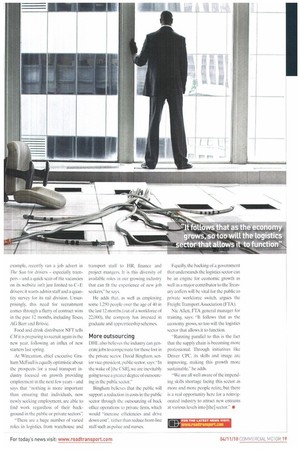Playing the numbers game
Page 18

Page 19

If you've noticed an error in this article please click here to report it so we can fix it.
Can the road transport industry provide jobs for the public sector workers who are set to lose theirs as a result of the CSR?
Words: Christopher Walton FOLLOWING THE Comprehensive Spending Review (CSR), the onus is now on the private sector to generate the jobs the country needs to drag itself out of economic malaise.
But can a road transport and logistics industry that has suffered in the past two years from reduced volumes and closures generate the jobs the government expects to replace the 490,000 public sector jobs that will he culled over the next five years?
Last week, Mick Jackson, chief executive of Skills for Logistics, told CM that he expected that, if logistics firms continue to grow and recruit at current rates, the sector could generate some 40,000 additional jobs
This is approximately 8% of the jobs lost in the public sector and, coinciden tally, logistics employs 8% of the UK workforce (some 2 million people).
At the same time, operators told CM that there were opportunities for unemployed public sector workers as they are always on the look out for the "right calibre of people-. The problem, however. could be meeting the two in the middle: matching the skills profile, the age profile and the geographic location of potential employees with industry needs could be quite problematic.
Much uncertainty Jackson explains that the private sector acting as the white knight to public sector redundancies comes with a big 'if'. He says: "If the [government] is right and the private sector can replace the 490,000 lost public sector jobs, then, as logistics employs 8% of people in the UK, we would pro rata have to employ 40,000 over four years.
"As logistics underpins every part of the economy, as each part of the economy recovers we should expect to see logistics activity rise and therefore a rise in vacancies" Jackson adds that skills-fit will be a big issue for people coming from the public sector, ergo it will be important to establish retraining programmes locally for the jobs needed, most of which are likely to have an operative focus "It also does not necessarily mean that all people losing their public sector jobs will he in their 50s, but I admit I haven't seen a likely age breakdown. We are certainly entering largely uncharted waters and I would think that people will become quite flexible when it comes to the skills they offer to employers at a time of high unemployment," he says.
However, operators are feeling cautiously optimistic. Stobart Group, for example, recently ran a job advert in The Sun for drivers — especially trampert — and a quick scan of the vacancies on its website isn't just limited to C+E drivers: it wants admin staff and a quantity survey for its rail division. Unsurprisingly, this need for recruitment comes through a flurry of contract wins in the past 12 months, including Tesco, AG Barr and Britvic.
Food and drink distributor NET tells CM it is preparing to recruit again in the new year, following an influx of new starters last spring.
At Wincanton, chief executive Graham MeFaull is equally optimistic about the prospects for a road transport industry focused on growth providing employment in the next few years — and says that "nothing is more important than ensuring that individuals, now newly seeking employment, are able to find work regardless of their background in the public or private sectors': "There are a huge number of varied roles in logistics, from warehouse and transport staff to HR, finance and project mangers. It is this diversity of available roles in our growing industry that can fit the experience of new job seekers." he says.
He adds that, as well as employing some 1,250 people over the age of 40 in the last 12 months (out of a workforce of 22,000), the company has invested in graduate and apprenticeship schemes.
More outsourcing DI-IL also believes the industry can generate jobs to compensate for those lost in the private sector. David Bingham, senior vice-president, public sector, says: "In the wake of [the CS R. we are inevitably going to see a greater degree of outsourcing in the public sector."
Bingham believes that the public will support a reduction in costs in the public sector through the outsourcing of back office operations to private firms, which would "increase efficiencies and drive down cost", rather than reduce front-line staff such as police and nurses.
Equally, the backing of a government that understands the logistics sector can be an engine for economic growth as well as a major contributor to the Treasury coffers will be vital for the public to private workforce switch, argues the Freight Transport Association (I-TA).
Nic Allen, ETA general manager for training, says: It follows that as the economy grows, so too will the logistics sector that allows it to function.
"Running parallel to this is the fact that the supply chain is becoming more professional. 'through initiatives like Driver CPC, its skills and image arc improving, making this growth more sustainable,he adds.
"We are all well aware of the impending skills shortage facing this sector as more and more people, retire, but there is a real opportunity here for a reinvigorated industry to attract new entrants at various levels into [the] sector." •
FOR THE LATEST NEWS VISIT: WWW.POMPanS1xIPI.00111




































































































































